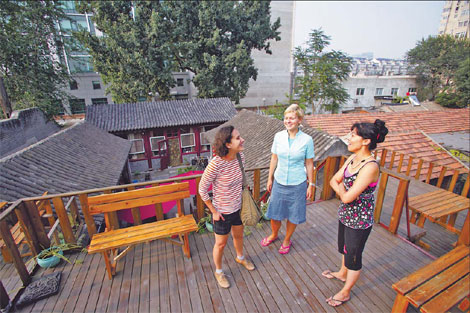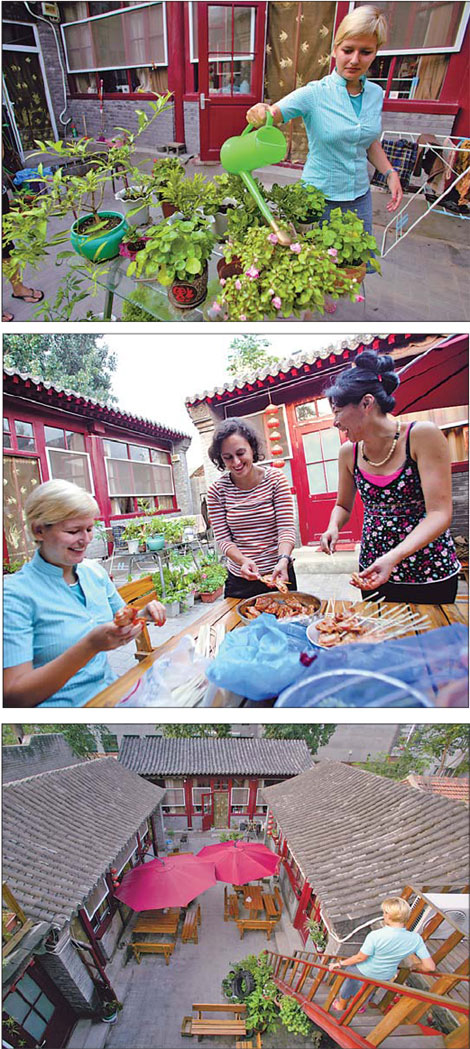People
Living with the locals
Updated: 2011-09-18 07:20
By Mike Peters (China Daily)
|
Xia Jie (right), known to her Western guests as Cindy, enjoys relaxing after work on the roof deck of her Beijing courtyard house. [Photos by Du Lianyi / China Daily] |
From a Beijing courtyard home to an Amsterdam houseboat, overnight options abound on websites that offer travelers local color in private housing. Mike Peters logs in to investigate.
Xia Jie spent a lot of years trying to get strangers out of her house.
The 37-year-old Beijinger, a fourth-generation Batiao neighborhood resident, traces the family's ownership from her great-grandmother's purchase of the house in 1948 to the ravages of the "cultural revolution" (1966-76).
Xia said the government took away the deed to the house, restricted her mother and herself to 12 square meters of living space, and moved in other people in need of housing.
The government returned the deed to the family in 1984, but then came a prolonged battle on two fronts - with developers eager to raze the area's hutong and with the non-owner residents who didn't want to leave without fair compensation to find new housing.
Today the family has control of the property, which has been delightfully restored to its traditional charm and updated with new plumbing and other amenities. Now, Xia is most happy with her surprisingly secluded retreat in the heart of the busy Dongcheng district when strangers once again occupy the living spaces.
But these strangers are not uninvited. They are paying guests, travelers who have found her listing on a website that offers either rooms or entire private homes for travelers who want more of a local experience than a hotel can provide.
Her home is listed on both Air B&B and Wimdu.com, a new site that has taken this segment of the travel industry by storm this year, thanks to a $90 million chunk of venture-capital charge from Rocket Internet and Kinnevik, two firms that are riding previous successes with Groupon/City Deal and Zalando.
"We match adventurous and discriminating globetrotters and interesting hosts," says Wimdu spokesman William Heathershaw, an American expat in Beijing. The site allows anyone to list, find and book private spaces on any budget, he says, from an inexpensive room for rent in New York to a luxury penthouse in Paris to a sailboat in Seattle.
The Germany-based Wimdu says it has used its big infusion of capital to develop what it calls the second-largest community marketplace for private space in the world - in just 100 days. Still only a few months old, Wimdu has listings for more than 25,000 apartments in more than 100 countries around the world.
That's been possible, the company says, because it has a team of hundreds of employees on the ground working in 50 countries in 16 languages. In China, Wimdu has a sister company, Airizu, that is Chinese-operated for Chinese customers.
"It's hard to copy a model from Europe and just drop it into China," says Wimdu's new China manager, Niels Vugteveen. "We had to research what people want in accommodations. The payment system was one challenge - property owners were used to getting rental fees paid up front. We collect money from the traveler, but we don't pay the host until afterward. This is a new idea in China, but the market here is growing."
The amiable Dutchman says about 40 percent of Wimdu's clients are now Chinese.
Most startups get launched on a shoestring, he says, but Wimdu's capital has allowed the company to offer 24/7 support and quality-control testers that actually see the listed properties and monitor listings to make sure that hosts are responsive to their bookings.
"So we know that the places on our sites are real," Vugteveen says. "You won't find a listing on our site for 'camping on Tian'anmen Square' or something like that which hasn't been verified."
Vugteveen eagerly scrolls through listings in cities such as Lijiang, Xi'an (yes, there's a terracotta warrior in one bedroom) and Chengdu that he says he can't wait to experience himself.
It can be an attractive option for traveling families, he says, who may find a week of so of hotel living both cumbersome and expensive.
"We actually learned to rent houses and apartments when we were living in Europe," says Beijing expat Allison DeLusque, "because it was much cheaper and certainly easier to have a kitchen for children. My kids are 4 and 6, so it's often easier to buy some local food and enjoy dinner at home while the kids go to sleep."
Interns and other workers in transit have also taken advantage of the site's short-term listings. Companies like Wimdu are a market outgrowth of social websites that have long catered to travelers who want to experience local life with locals, not guides operating from sterile hotel settings.
Sites such as Couchsurfing.com and Hospitality Club have millions of members who thrive on being guests of like-minded hosts.
In the new wave of sites, the profiles are more about the properties, not the people. In a recent promotion in Europe, Vugteveen says, a company contest has promoted "the world's best job", in which the winner will get to be a "bed tester" for Wimdu and travel the continent "with a bag of money and a camera".
And then there's Xia Jie, who enjoys being a hutong host so much you sense she's already got the world's best job.
"When we lost the rights to our home in the '60s and '70s," she says, "the people around me were uninvited strangers. Now I am surrounded by people I am happy to share a bottle of wine with - and I do! I love for my guests to sit in my courtyard and enjoy what we've been able to create here."
Her guests might stay for a night or a month, savoring the traditional one-story siheyuan architecture with its gracefully curving roofs. That, says Wimdu's Vugteveen, is giving travelers a sense of a city that no hotel can match.
|
Cindy's guests participate in household chores and often gather for courtyard barbecues with their host when the weather is fine. The roof deck offers a view of the neighborhood and a history lesson about local architecture. |
E-paper

The snuff of dreams
Chinese collectors have discovered the value of beautiful bottles
Perils in relying on building boom
Fast forward to digital age
Bonds that tie China. UK
Specials

Let them eat cake
Cambridge University graduate develops thriving business selling cupcakes

A case is laid to rest
In 1937, a young woman'S body was found in beijing. paul french went searching for her killer

Banking on change
Leading economist says china must transform its growth model soon


